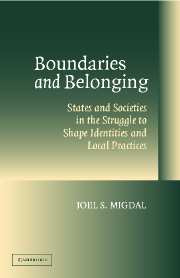 Boundaries and Belonging
Boundaries and Belonging Book contents
- Frontmatter
- Contents
- List of Contributors
- Preface and Acknowledgments
- PART I INTRODUCTION
- PART II ON THE EVE OF THE NATION-STATE: THE OTTOMAN EMPIRE
- PART III THE STATE AND “DANGEROUS POPULATIONS”
- 4 “Dangerous Populations”: State Territoriality and the Constitution of National Minorities
- 5 Making Myanmars: Language, Territory, and Belonging in Post-Socialist Burma
- 6 Institutionalizing Virtual Kurdistan West: Transnational Networks and Ethnic Contention in International Affairs
- PART IV INSCRIBING MEMBERSHIP AND CONTESTING MEMBERSHIP IN THE NATION
- PART V BEYOND THE STATE: TRANSNATIONAL FORCES AND THE CHALLENGE TO THE STATE
- PART VI CONCLUSION
- Index
5 - Making Myanmars: Language, Territory, and Belonging in Post-Socialist Burma
Published online by Cambridge University Press: 25 July 2009
- Frontmatter
- Contents
- List of Contributors
- Preface and Acknowledgments
- PART I INTRODUCTION
- PART II ON THE EVE OF THE NATION-STATE: THE OTTOMAN EMPIRE
- PART III THE STATE AND “DANGEROUS POPULATIONS”
- 4 “Dangerous Populations”: State Territoriality and the Constitution of National Minorities
- 5 Making Myanmars: Language, Territory, and Belonging in Post-Socialist Burma
- 6 Institutionalizing Virtual Kurdistan West: Transnational Networks and Ethnic Contention in International Affairs
- PART IV INSCRIBING MEMBERSHIP AND CONTESTING MEMBERSHIP IN THE NATION
- PART V BEYOND THE STATE: TRANSNATIONAL FORCES AND THE CHALLENGE TO THE STATE
- PART VI CONCLUSION
- Index
Summary
In the 1990s, an elite-level struggle over political power in Burma remapped the politics of belonging and language in the country for the first time in over a century. National borders did not change, but an internal divider that marked off the unquestioned political center from its attendant margins suddenly became permeable and contentious. First established as a colonial administrative simplification in the late nineteenth century, this boundary between the central areas and what became known as the “Frontier” or “Excluded” areas demarcated where politics happened, who could be what kind of citizen or subject, and which language would animate struggles for power throughout the twentieth century. After political independence in 1948, the colonial-established distinction between center and margins persisted until just after the 1988 pro-democracy uprising, which sprang up mostly in the central region. The uprising toppled the weak Burma Socialist Program Party regime, but the struggle for control over the successor state took several years to play out. Along the way, the seemingly solid barrier between the center and frontier became porous, destabilizing the spatial logic that had characterized and pacified political conflict in the modern era. After 1988, ethnic minority populations long held in ambivalent categories of lesser citizenship and territory that rarely crossed the central state's radar screen became potentially formidable threats to those in power in the center.
Information
- Type
- Chapter
- Information
- Boundaries and BelongingStates and Societies in the Struggle to Shape Identities and Local Practices, pp. 99 - 120Publisher: Cambridge University PressPrint publication year: 2004
Accessibility standard: Unknown
Why this information is here
This section outlines the accessibility features of this content - including support for screen readers, full keyboard navigation and high-contrast display options. This may not be relevant for you.Accessibility Information
- 14
- Cited by